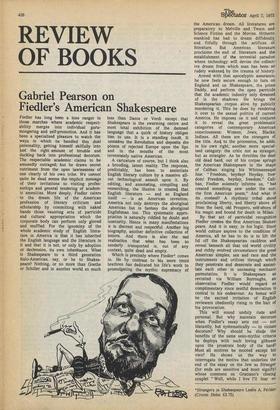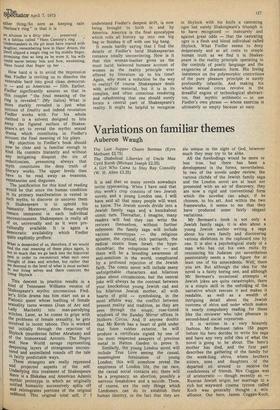Gabriel Pearson on Fiedler's American Shakespeare
Fiedler has long been a lone ranger in those marches where academic respect. ability merges into individual gurumongering and self-promotion. And it has been a specialised pleasure to watch the ways in which he handled this dual personality, getting himself skilfully into just the right amount of trouble and ducking back into professional decorum. The respectable academic claims to be amusedly outraged; but he draws secret nutriment from the open lawlessness of one clearly of his own tribe. We cannot quite be dead seems the implicit message of their invitations to visiting professorhips and general tendering of academic amenities. More deeply, Fiedler caters to the dream life of the American profession of literary criticism and scholarship by committing with naked hands those vaunting acts of parricide and cultural appropriation which the corporate body can perform only gloved and muffled. For the ignominy of the whole academic study of English literature in America is that it has inherited the English language and the literature in it and that it is not, or only by adoption or declension, its own inheritance. What is Shakespeare to a third generation Ralo-American, say, or he to Shakespeare? Nothing, or no more than Goethe or Schiller and in another world so much less than Dante or Verdi except that Shakespeare is the swarming centre and most total exhibition of the damned language that a quirk of history obliges him to use. It is a standing insult It unmakes the Revolution and deposits the poison of rejected Europe upon the lips and in the mouths of the most inveterately native American.
A caricature of course, but I think also a brooding, latent reality. The response, predictably, has been to assimilate English literary culture by a massive allout technological assault upon it. By editing, and annotating, compiling and researching, the illusion is created that English literature — and so England itself — is an American invention. America not only destroys the aboriginal American but in fantasy the aboriginal Englishman too. This systematic appropriation is naturally riddled by doubt and insecurity. Hence in many manifestations it is discreet and respectful. Another big biography, another definitive collection of letters. And there is also the sad realisation that what has been so tenderly transported is, out of any context, quite dead and empty.
Which is precisely where Fiedler* comes in. He by contrast to his more timid brethren has dedicated his life's work to promulgating the mythic supremacy of the American dream. All literatures are preparatory to Melville and Twain and Science Fiction and the Movies. Hitherto mankind has had to dream diffidently and fitfully through the artifices of literature. But American literature proclaims the end of literature and the establishment of the terrestial paradise where technology will devise the collective dream from which man has been so rudely wakened by the trauma of history.
Armed with that apocalyptic assurance, he now feels secure enough to turn on England and on Shakespeare, the prime Daddy, and perform the open parricide that the academic industry only dreamed of in the shadows. He brings the Shakespearian corpus alive by publicly murdering it. This he does by rendering it over to the sexual politics of current America. He imposes on it and conjures it to reveal the great problematic categories of contemporary American consciousness: Women; Jews; Blacks; Indians. All these are the strangers of the title. And to the procession, he adds, in his own right, another more special ised category: the critic not as stranger, but as strangler. As he throttles the dear old dead bard, out of his corpse springs the American Shakespeare in the shape of Catitian singing his Whitmanesque line: " Freedom, heyday! Heyday, free dom! Freedom, heyday, freedom." Cali ban, Fiedler solemnly informs us, "has created something new under the sun: the first American poem." And what is its , content? A rhythmic tribal shout proclaiming liberty, and liberty above all from the bard, Old Prospero, self-shorn of his magic and bound for death in Milan.
By that act of parricidal recognition Fiedler creates the first American Shakespeare. And it is easy, in his logic. Since world culture aspires to the condition of America, all he has to do is to lift the lid off the Shakespearian cauldron and reveal beneath all that old world civility and richly evolved circumstance the great American simples, sex and race and the instruments and orifices through which they penetrate and desecrate and assimilate each other in unceasing mechanic permutation. It is Shakespeare as revisited via William Burroughs, an observation Fiedler would regard as complimentary since zestful desecration iS central to his endeavour. As bonus will be the excited irritation of English reviewers obediently rising to the bait of his provocation. This will sound unduly rude and personal. But why maintain decorum when Fiedler's essay sets out — not blatantly, but systematically — to violate decorum? Why should he elude the benefits of the same sexo-mythic criteria he deploys with such loving glibness upon the prostrate body of the bard? Must all motives be mooted except his own? He shows us the way to interrogate the motive that underlies the end of the essay on the Jew as Stranger (for ends are sensitive and must signify) whose comment on Gratiano's closing couplet " Well, while I live I'll fear n Other thing/So sore as keeping safe Nerissa's ring " is that it is an allusion to a dirty joke . . . preserved . . in a fabliau called "Hans Castorp's ring . ." Understanders in the pit must have roared with laughter, remembering how in Hans' dream, the Devil slipped a magic ring on his middle finger, Promising that so long as he wore it, his wife could never betray him and how, awakening, Hans found that finger up her . .
How hard it is to avoid the impression that Fiedler is inviting us to dissolve the venerable bard into good clean democrat ic — and so American — filth. Earlier, Fiedler significantly assures us that in this couplet "the final meaning of the ring is revealed." (My italics) What is More starkly revealed is just what notions of finality and indeed revelation Fiedler works with. For his whole method is a solvent designed to bite away the figured surface of Shakespeare's art to reveal the mythic sexual drama which constitutes in Fiedler's account the final meaning of his plays.
My objection to Fiedler's book should now be clear and is familiar enough in kind. He commits blatantly and without any mitigating disquiet the sin of reductionism, presuming always that Myth constitutes the deep truth of literary works. The upper levels then have to be read, away as evasions, resistancies and disguises.
The justification for this kind of reading Would be that since the human condition in its primary manifestation is vested in such myths, to discover or uncover them in Shakespeare is to uphold his humanity. Moreover, since these myths remain immanent in each individual unconsciousness. Shakespeare is really all of us, universally and as it were preculturally available. It is again a democratic availability which Fiedler quite explicitly proffers: What is demanded of us, therefore, if we would find the real meaning of these plays again, is not so much that we go back into the his,torical Past in order to reconstruct what men once thought of Jews and witches, but rather that we descend to the level of what is most archaic inour living selves and there contront the living Shylock . . .
This descent in practice results in a kind of Tennessee Williams version of Shakespeare's mythic unconscious. Fled,ler's little drama has him start out as a Platonic queer whose loathing of female sexuality turns women (Joan of Arc and Lady Macbeth) into man-parodying Witches. Later, as he comes to grips with the problems of female sexuality, he gets involved in incest taboos. This is worked out initially through the rejection of Shylock (murderous father Abraham) and of the homosexual Antonio. The Negro and New World savage representing deepening layers of strangeness encountered and assimilated rounds off the tale in fairly predictable ways. These strangers are really repressed and projected aspects of the self. Underlying this treatment of Shakespeare there is a Blakeian and American Adamic mythic prototype in which an originally unified humanity successively splits off and reintegrates portions of the original selfhood. This original total self, if I understand Fiedler's deepest drift, is now being brought to birth in and by America. America is the final apocalypse which rolls all history up into one big bag or finishes it off with one big bang.
It needs hardly saying that I find the details of Fiedler's lurid Shakespearian romance totally unconvincing. How is it that this woman-loather gives us the must lucid, balanced humane account of women as the reality principle ever offered, by literature up to his time? Again, why must a reduction be the way to reality? Of course Shakespeare deals with archaic material, but it is in its complex, and often conscious rendering and refashioning that one should surely locate a central part of Shakespeare's reality. It might be helpful to recognise in Shylock with his knife a castrating ogre but surely Shakespeare's triumph is to have recognised — insecurely and against great odds — that the castrating ogre is a flesh and blood individual called Shylock. What Fiedler seems to deny desperately and at all costs to simple human truth as we find it in .Shakespeare is the reality principle operating in the controls of poetic language and the exigencies of dramatic form. His loving insistence on the polymorphic contortions of the pure pleasure principle is surely profoundly infantile. And making his whole sexual circus revolve is the dreadful engine of technological abstraction, that mythic arithmetic — to use Fiedler's own phrase — whose exercise is ultimately so empty because so easy.



































 Previous page
Previous page